Top to Bottom
Somua S-35
Hotchkiss H-39
Char B1 bis
Renault R-35
Somua S-35
-
Weight: 20 tons
Crew: 3
Speed: 24.8 mph
Range: 124 miles
Armament: one 47mm SA 35 (118 rounds), one 7.5mm Reibel co-axial MG (3,000 rounds)
Armor: Hull: 40mm front/40mm side, Turret: 56mm front/56mm side
The 47mm cannon was better than anythingmounted on German tanks (34 calibre, muzzle velocity 2,200 ft/sec), able to penetrate 52mm of armor (plate at 30-degree angle) at 1,000 yards. Such ideal conditions were rare in battle.
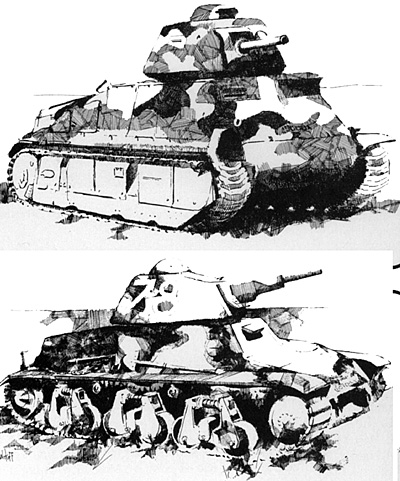
Above:
Hotchkiss H-39
-
Weight: 12 tons
Crew: 2
Speed: 22.3 mph
Range: 93 miles
Armament: one 37mm SA 38 (100 rounds), one 7.5mm 1931 co-axial MG (2,400 rounds)
Armor: Hull: 40mm front/40mm side
An improved version of the H-35. The 37mm cannon (33 calibre, muzzle velocity 2,300 ft/sec), was roughly equivalent to the gun in a German Pz III. It would penetrate 36mm of armor (plate at 30-degree angle) at 500 yards and 28mm at 1,000 yards.
Below:
Char B1 bis
-
Weight: 32 tons
Crew: 4
Speed: 17.9 mph
Range: 86.8 miles
Armament: one 75mm cannon in hull, one 47mm cannon in turret, one 7.5mm MG
Armor: Hull: 60mm front/40mm side
It had the same HSX turret as the S-35. The crew communicated through voice tube. These tanks were equipped with self-sealing fuel tanks and two radios which rarely worked. The thich armor plating was invulberable to German guns.
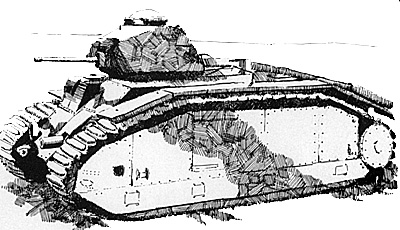
Below:
Renault R-35
-
Weight: 10.6 tons
Crew: 2
Speed: 11.8 mph
Range: 86.8 miles
Armament: one 37mm SA 18 (58 rounds), one 7.5mm M31 co-axial MG (2,500 rounds)
Armor: Hull: 32mm front/40mm side, Turret: 45mm front/44mm side
The old 37mm cannon (model 1918) penetrated 25mm of armor (plate at 30-degree angle) at 500 yards--its maximum effective range (21 calibre, muzzle velocity 1,273 ft/sec). Communications between R-35 and H-39 tanks was by flag signals.
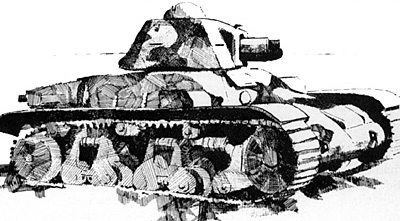
Renault R-35 Turret
All French tanks shared one thing in common: one-man turrets. This was a serious handicap in battle, as it over-taxed the French tank commander. He acted as loader and gunner, as well as tactical leader for the tank or squadron. Suspended in a harness or perched on a small seat, he had to watch for signals from other tanks, keep an eye out for enemy vehicles, pick targets, and signal other tanks with his radio or flags. Trying to coordinate this while giving directions to the driver with the intercom or tapping him on the shoulder with his foot, it is amazing that many French units performed as well as they did.
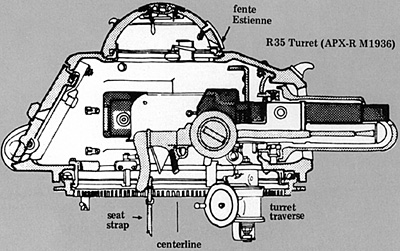
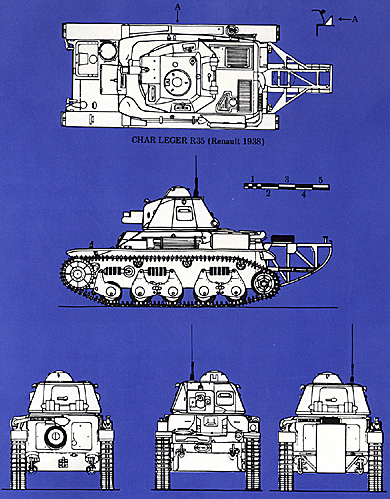
More French Armored Divisions
-
French Armored Divisions
French Division Legere Mechanique
French Division Cuirassee
French Tanks and Specs
French Tank Commanders
Large Map of Armor Movements: May 10-17 (slow: 136K)
Jumbo Map of Armor Movements: May 10-17 (very slow: 211K)
Related
Back to Conflict Number 4 Table of Contents
Back to Conflict List of Issues
Back to MagWeb Master Magazine List
© Copyright 1998 by Dana Lombardy
This article appears in MagWeb (Magazine Web) on the Internet World Wide Web.
Other military history articles and gaming articles are available at http://www.magweb.com